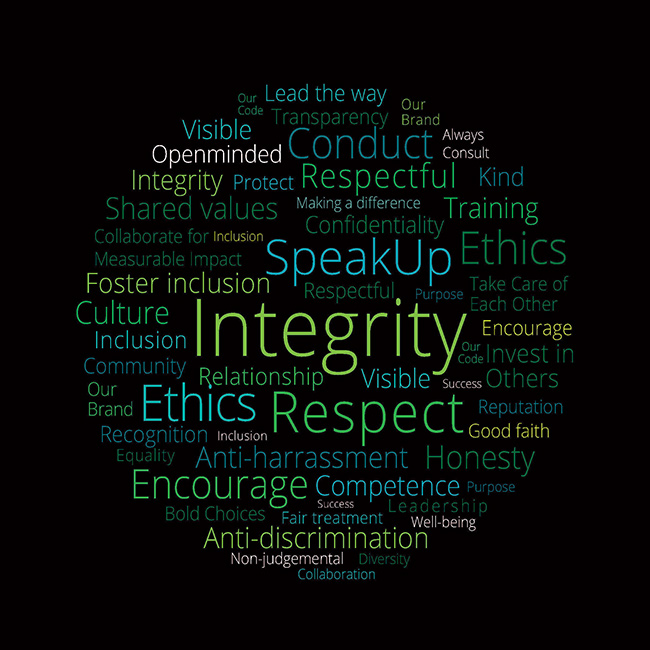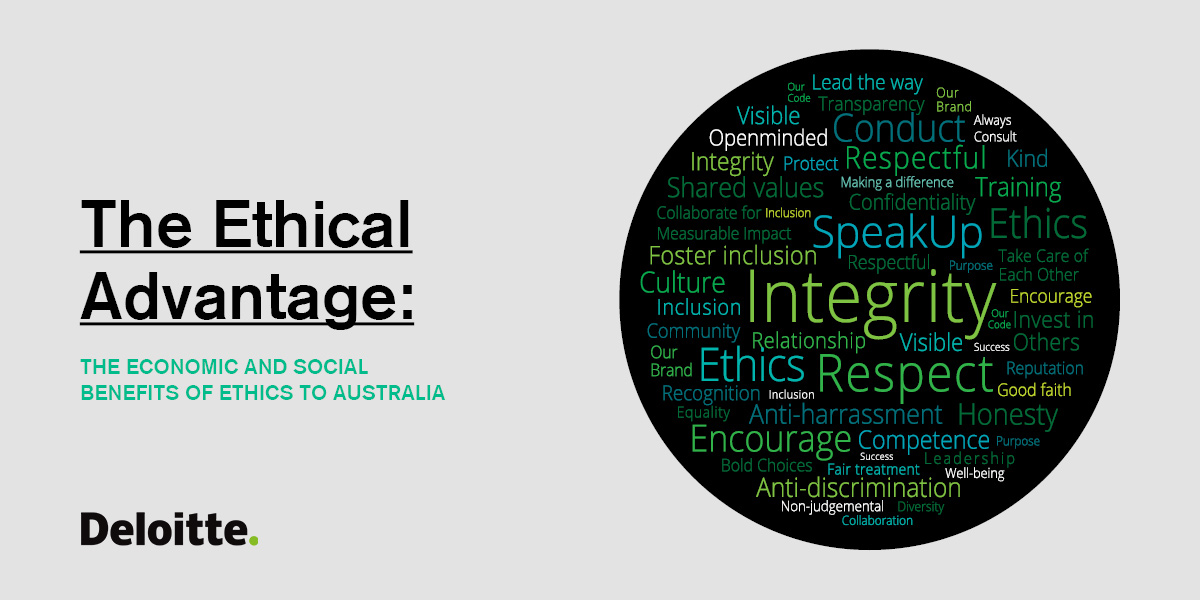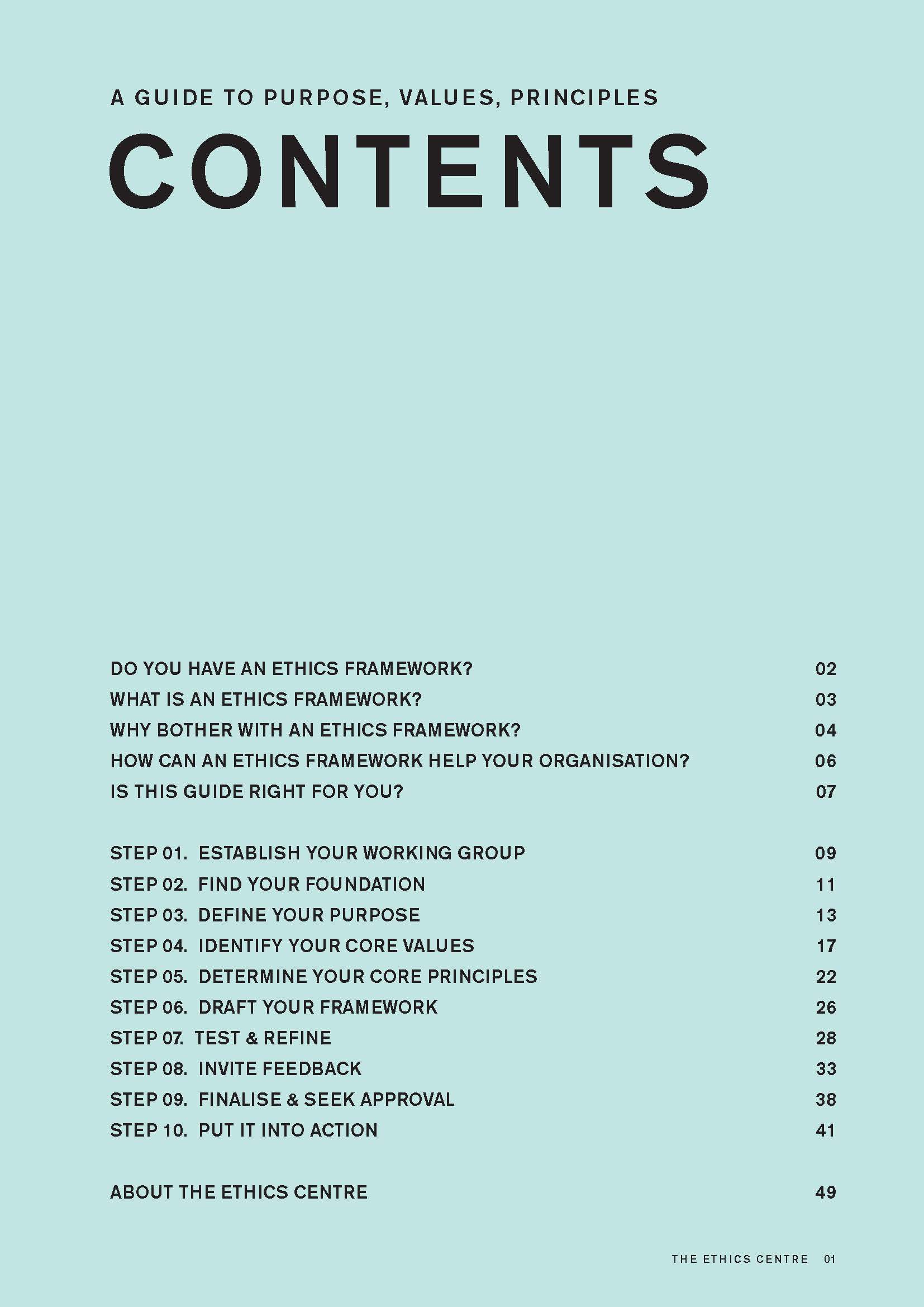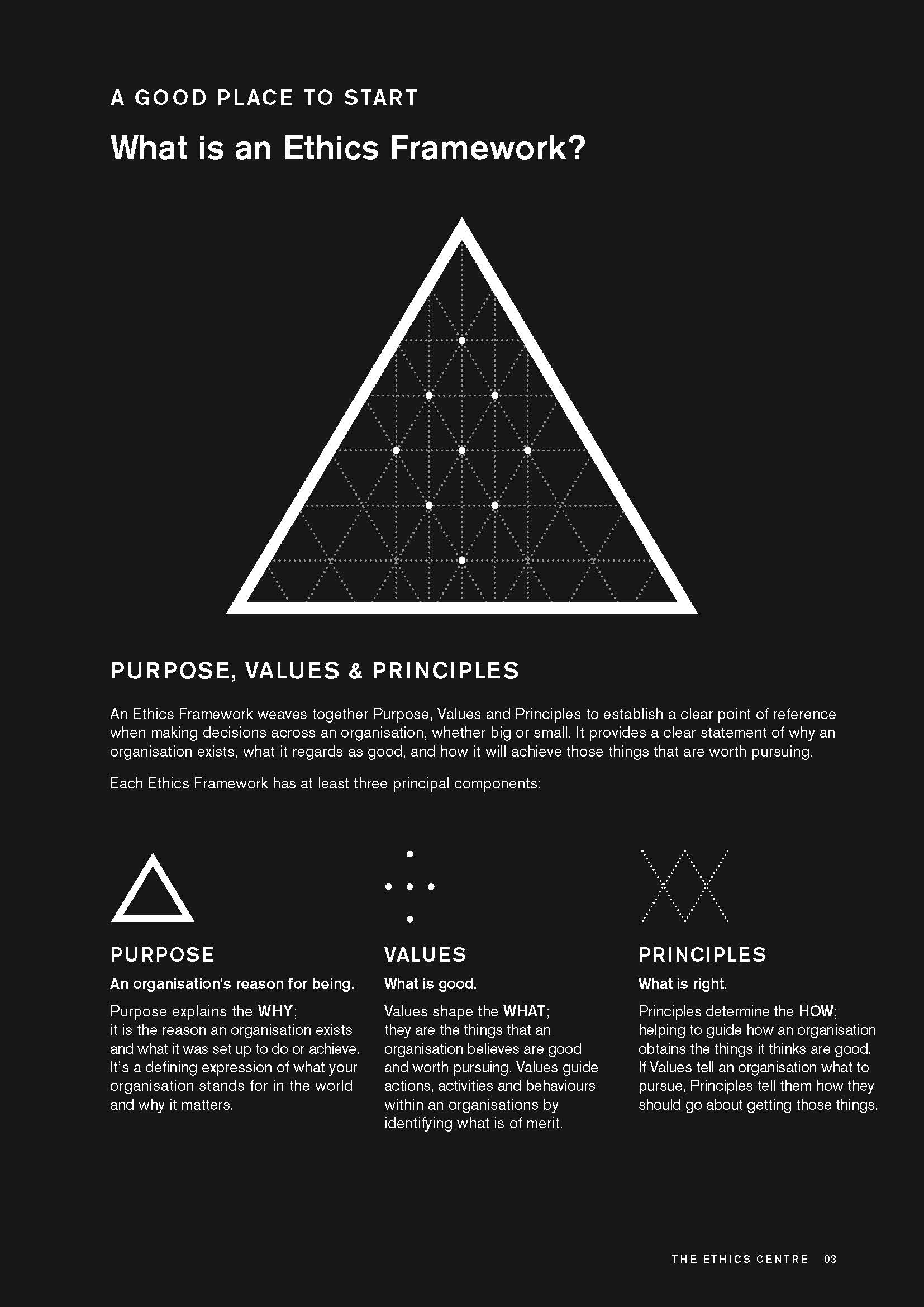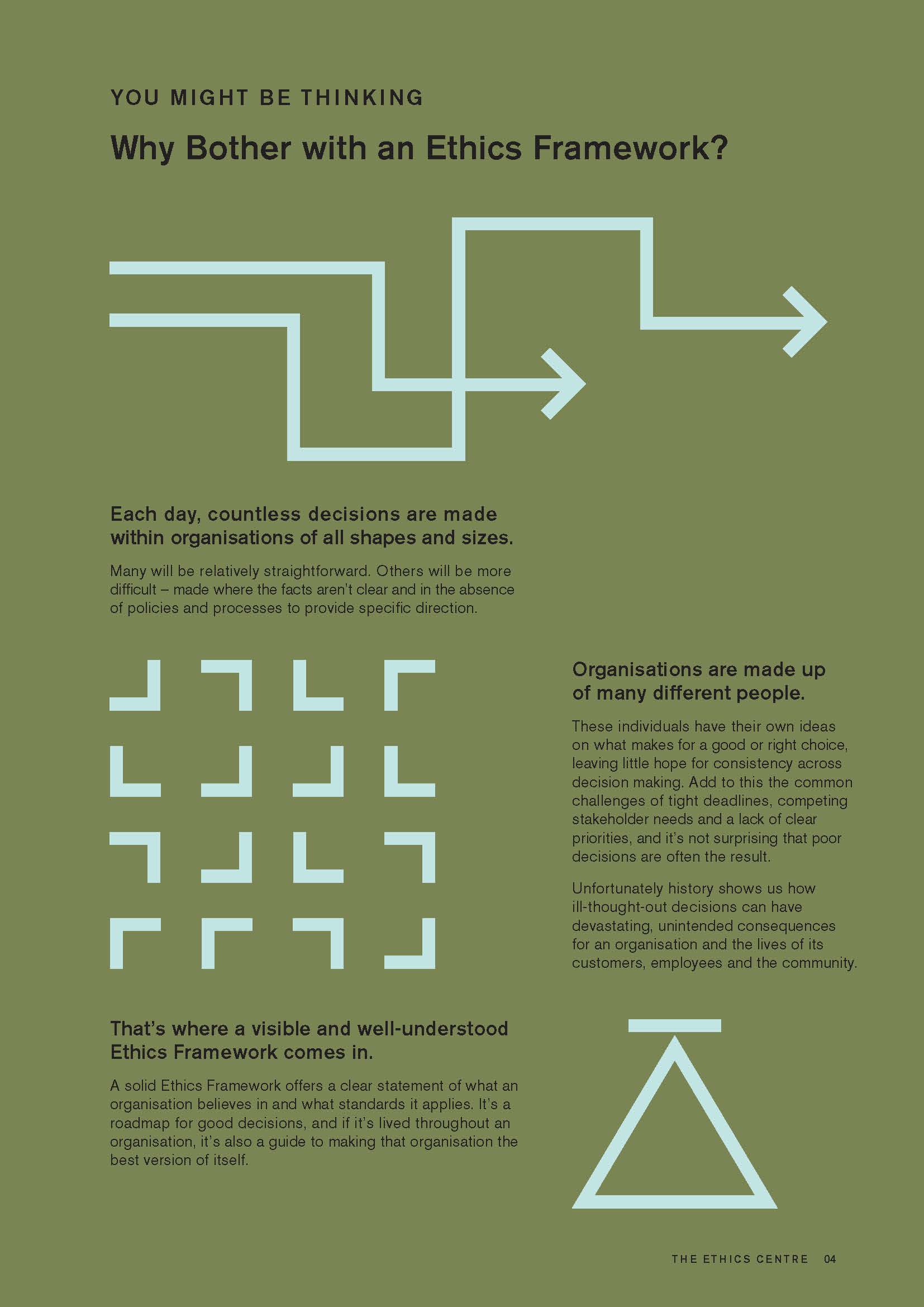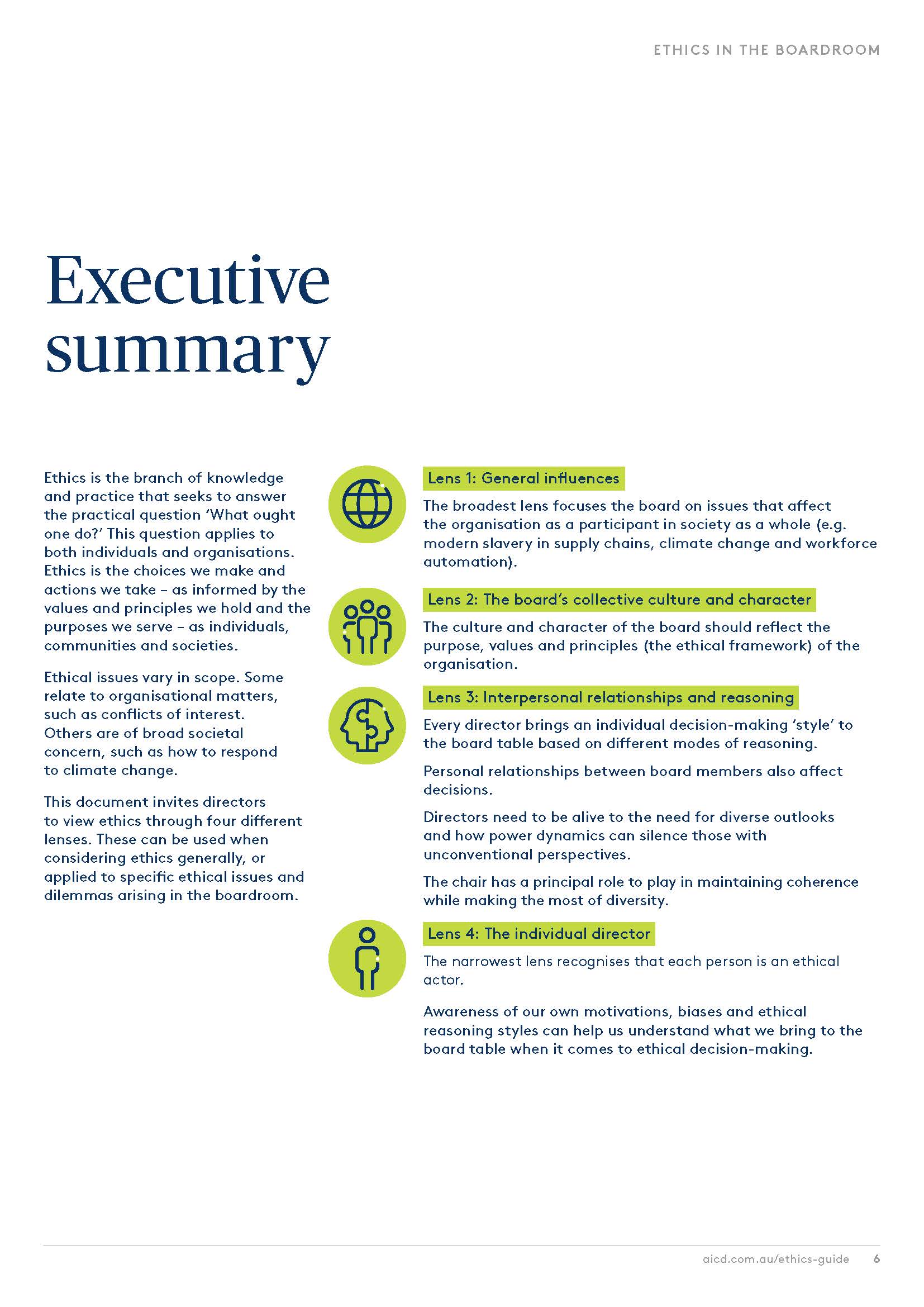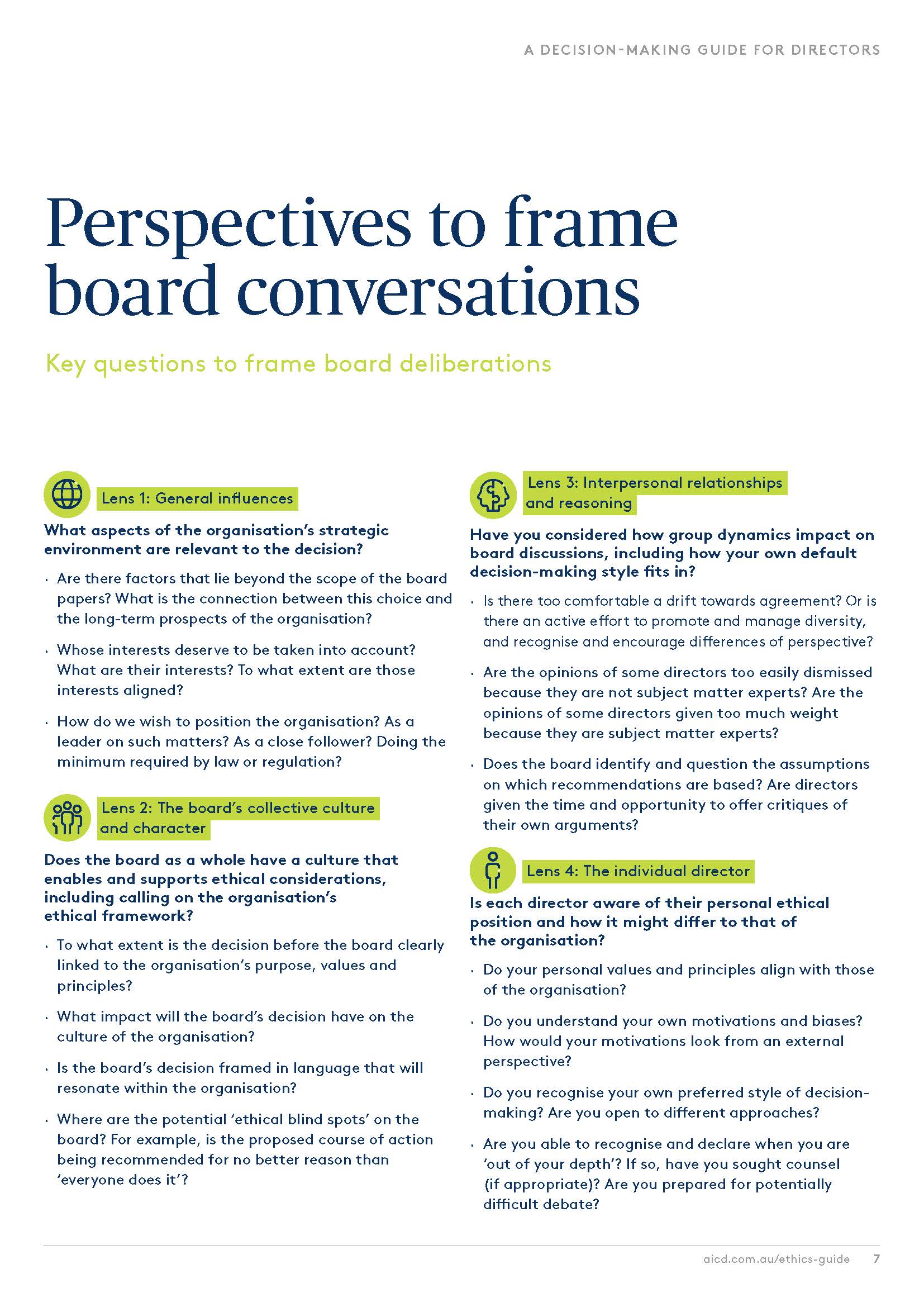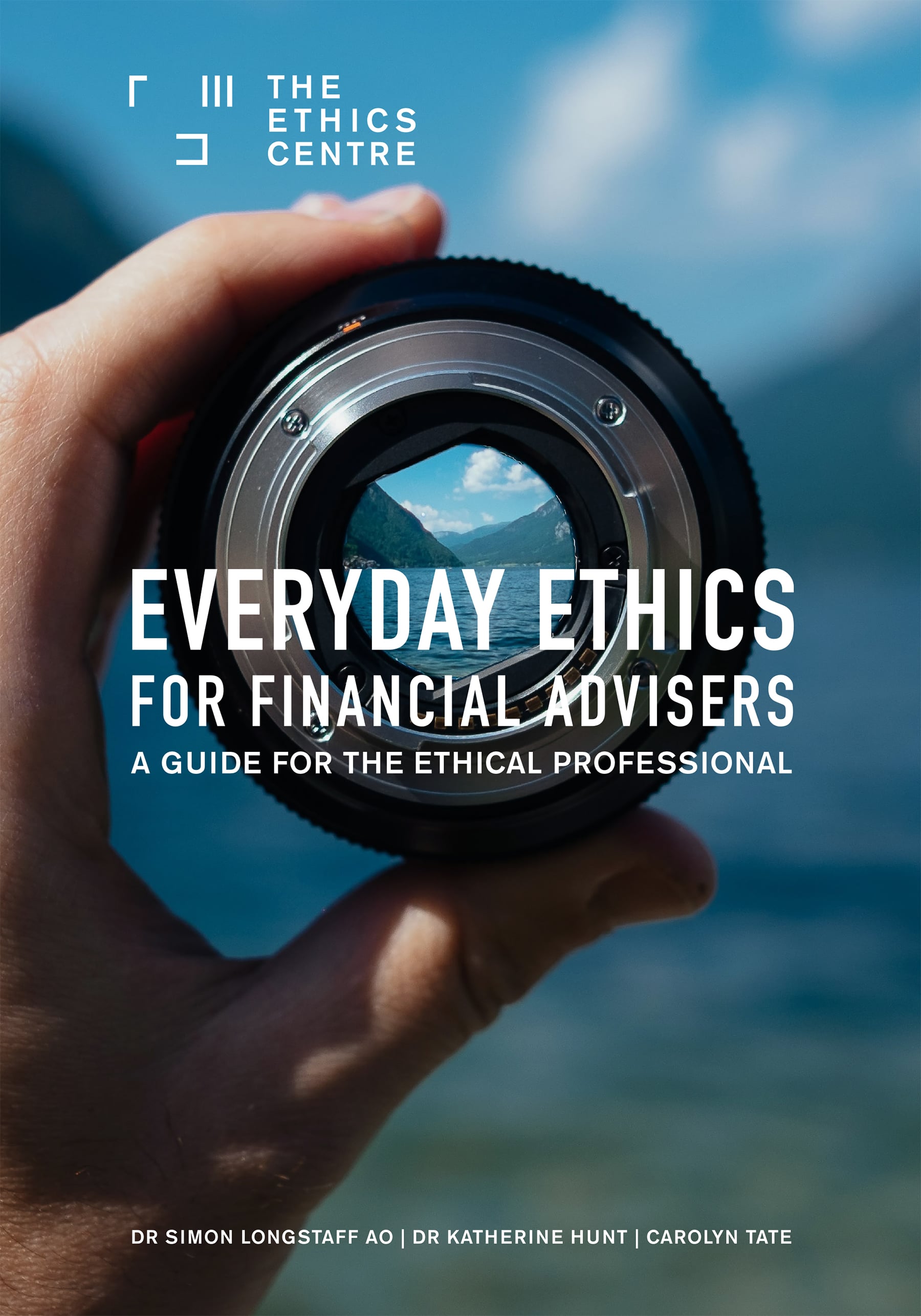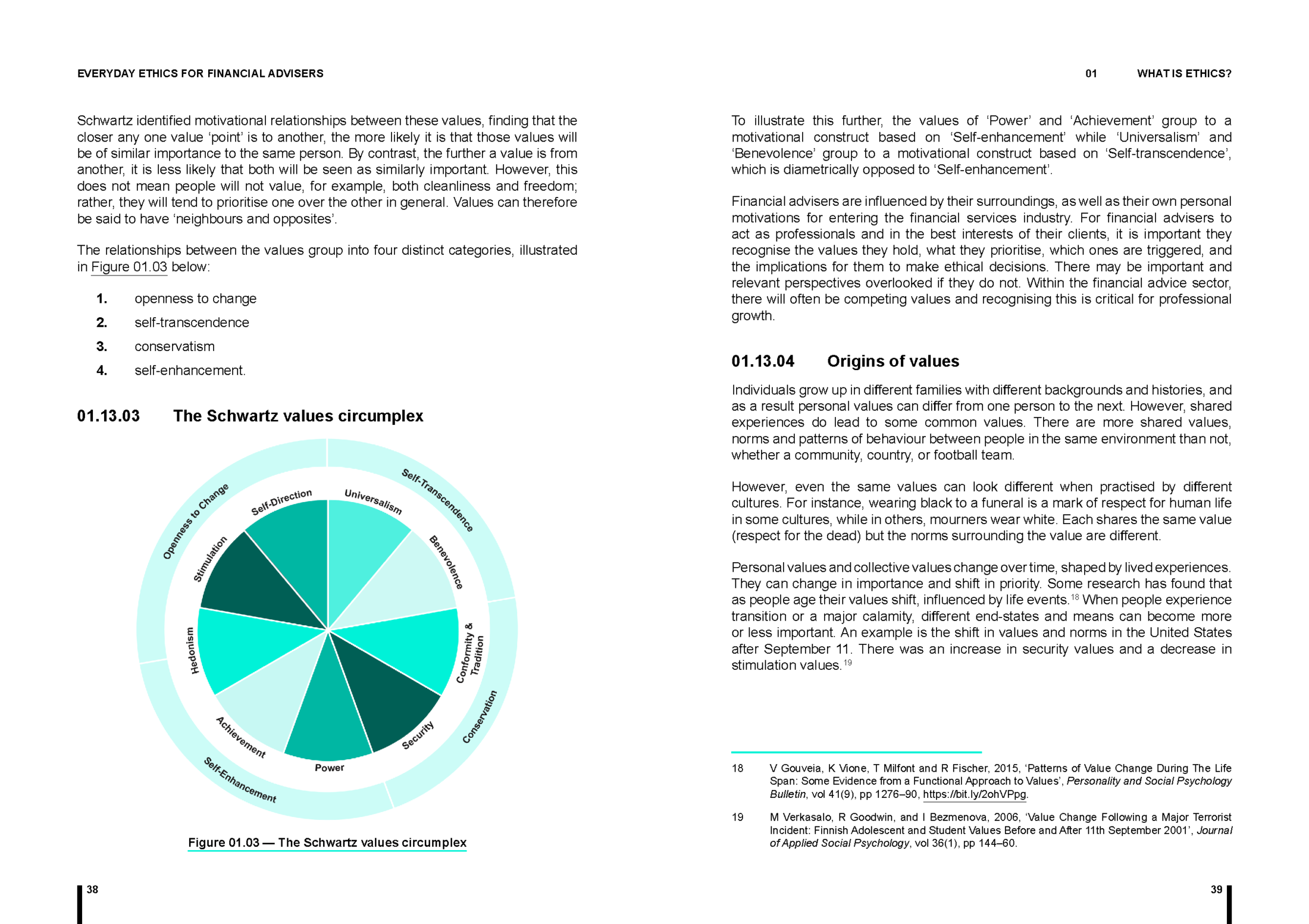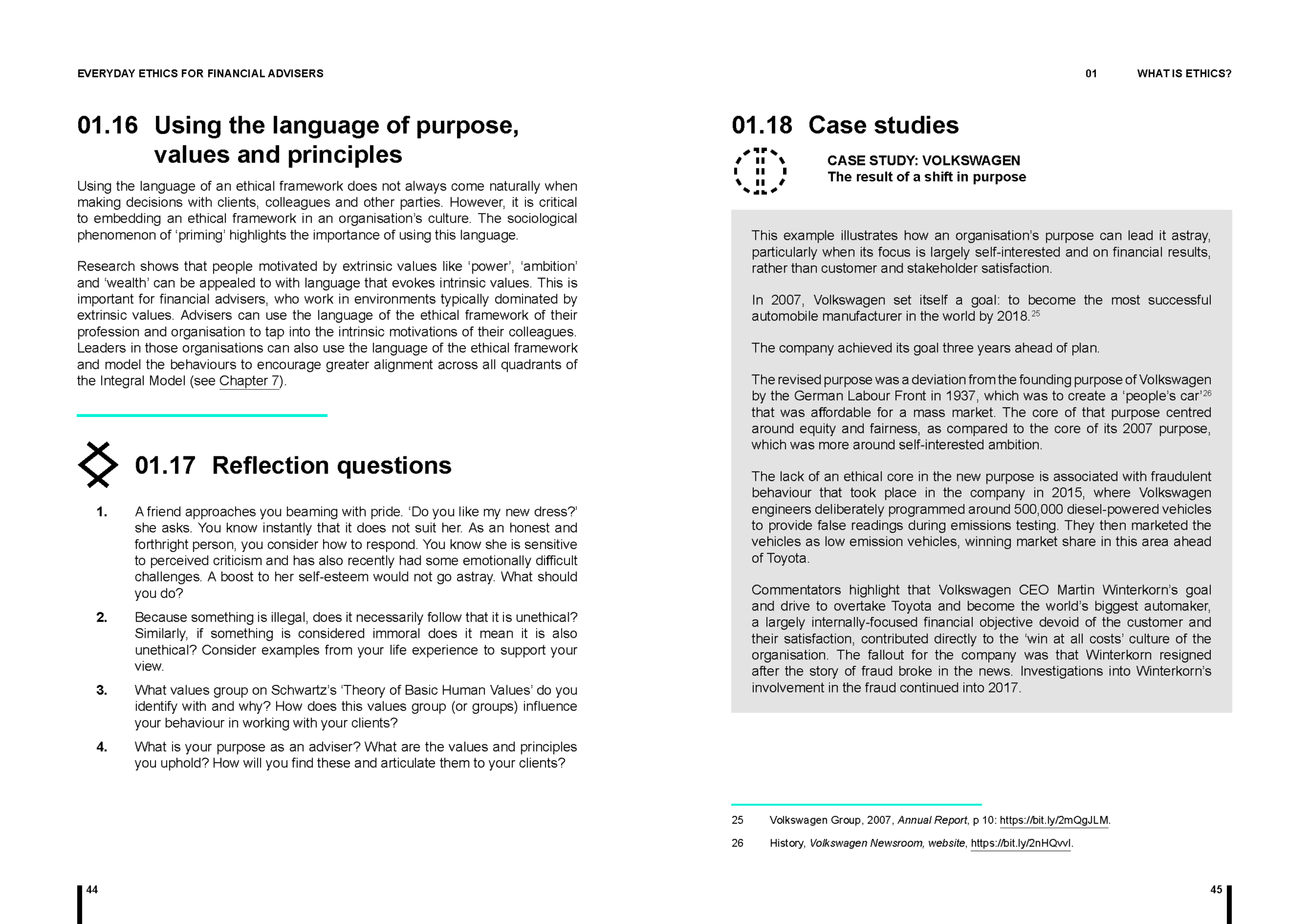The Ethical Advantage
The ethical advantage: the economic and social benefits of ethics to Australia
We know what ethical failure costs – look at the billions of dollars paid by financial institutions in penalties and customer remediation since Hayne. But what are the economic benefits of ethical best practice? What can we gain economically by being more ethical as a nation?
Turning around the loss of trust in government, corporations and institutions could deliver Australians significant economic and social dividends. The Ethical Advantage’s exclusive new economic modelling by Deloitte Access Economics shows that if our leaders, businesses, institutions and everyday Australians made more ethical decisions, our GDP, wages, corporate returns and mental health would improve.
For the first time, the report quantifies the benefits of ethics for individuals and for the nation. An increase in ethical behaviour could raise Australians’ average income by $1,800 a year, lifting GDP by $45 billion. An increase in a company’s performance based on ethical perceptions can increase return on assets by about 7%. The modelling also reveals a host of individual and collective benefits for Australians across wages, trust and mental health.
The report also identifies five interlinked areas for improvement for Australia and its approach to ethics, supported by 30 individual initiatives. Download a copy to learn more.
ECONOMIC ADVANTAGE
$45,000,000,000
Lifting Australia's trust levels to that of global leaders would increase the GDP by $45 Billion
BUSINESS ADVANTAGE
7%
Improving a businesses ethical reputation can lead to a 7% increase in return on assets (ROA)
INDIVIDUAL ADVANTAGE
2.7%
A 10% increase in ethical behaviour is associated with a 2.7% increase in individual wages ($23 bil accumulative)
“It is only right to examine how ethical-decision making benefits society. It is not surprising that some of the benefits are demonstrable in economic terms. As a result, purposeful investment to build ethical infrastructure makes sense for our societies and our economies. As we strive to prosper within planetary boundaries and achieve truly inclusive societies, there is urgency to build trust and the capacity navigate these complex challenges. The practical initiatives proposed in this report provide a blueprint for building the ethical infrastructure we need. The recommendations are farsighted in their aims, and their systematic pursuit cannot start soon enough.”
NATHAN FABIAN
Chief Responsible Investment Officer, Principles for Responsible Investment and Chair, European Platform for Sustainable Finance.
“This is a fascinating report showing the value – in every sense of the word – of embedding more ethical reasoning in daily life. I don't think I have ever seen quite such a broad, evidence-based, and wise account of the state of ethics in a society. Perhaps its most important message is that ethics, and ethical reflection, should just be part of everyday decision-making, rather than something to be contracted out to specialists, or worried about only when things have gone badly wrong. Here is an impressive call for a bit more thoughtful examination in every aspect of our public as well as our private lives.”
SIR GEOFFREY MULGAN
CBE, Professor of Collective Intelligence, Public Policy and Social Innovation, University College London
“While there is constant criticism that the school curriculum is overcrowded, this report presents robust arguments why skilling young people around ethical decision-making is to equip them with a capability that not only benefits society and communities, but their own future resilience and wellbeing. If we want to develop independent, life-long learners through our education system – engaged citizens who can operate effectively in a complex, fast-changing and dynamic society – a capacity to think ethically must be a compelling foundation. The Greeks knew it. This new report explains why we may need to rediscover it.”
MARK SCOTT
Secretary, NSW Department of Education
“As our society goes through a time of profound change, both locally and globally, it is timely to reflect on the importance of ethics. This study makes a powerful economic case for investing in the development or improvement of ethics in our society. The real challenge is how we improve our ethical behaviour, both individually and as a society. Directors, as leaders of their organisation, have a key role to play. The days when boards ‘commanded respect’ are over. Directors must approach their task of governance with humility seeking to earn the respect and trust of all their stakeholders. Learning how to deploy an ethical framework to guide decision making is key to ensuring decisions are made in the best interests of the organisation after due consideration is given to the interests of relevant stakeholders.”
JOHN ATKIN
Chair, Australian Institute of Company Directors
“The continuing discussion of the role of ethics and ethical decision making in all our institutions is so important in uncertain times. Most Australians are still not sure we trust our institutions and younger Australians are more cynical about the underlying frameworks used to make decisions and trade-offs. This dissonance is not healthy and needs to be part of our path forward from COVID crisis management and a multitude of royal commission findings into trust, ethical decision-making and choices made. We need to find a way to be our best selves, every day. We need ways of continuing visibility of the measures of ethical standards and to be held accountable for improvement across all industries and sectors in Australia.”
ANN SHERRY
Chair, Unicef Australia
“On the back of numerous royal commissions and recent corporate events, this timely and important report holds a mirror to those of us in the director community, challenging us to understand what we expect of our leadership in governance and whether we have met stakeholder ethical considerations. Do the existing power structures and leadership models reinforce inertia because they benefit ourselves and the status quo at the expense of ethical outcomes? If we do not address these issues, the increasing cynicism around our governance will render us ineffective over time. Are we worthy of the community's trust?”
MING LONG AM
Chair, AMP Capital Funds Management; Deputy Chair, Diversity Council of Australia
“Of all the things that keep a society together, none is more important than a shared sense of ethics. Without it there can be no trust or shared sense of purpose and so no prospect of facing the challenges or realising the opportunities ahead. This report both explains why ethics matter and what we can do to strengthen their central role in our society and economy. Its work on the economic benefits of ethical behaviour is ground-breaking. We should not need an economic rationale for ethical behaviour but by quantifying the economic benefits, this report adds a compelling strand to advocacy on why ethics are foundational.”
PETER VARGHESE
Chancellor, The University of Queensland
“This is a major reform initiative which opens the gates for deep cultural and social change based on a foundation of substantial economic benefit. Australia would be wise to embrace these principled imperatives.”
STEPHEN LOOSLEY
Senior Fellow, Australian Strategic Policy Institute
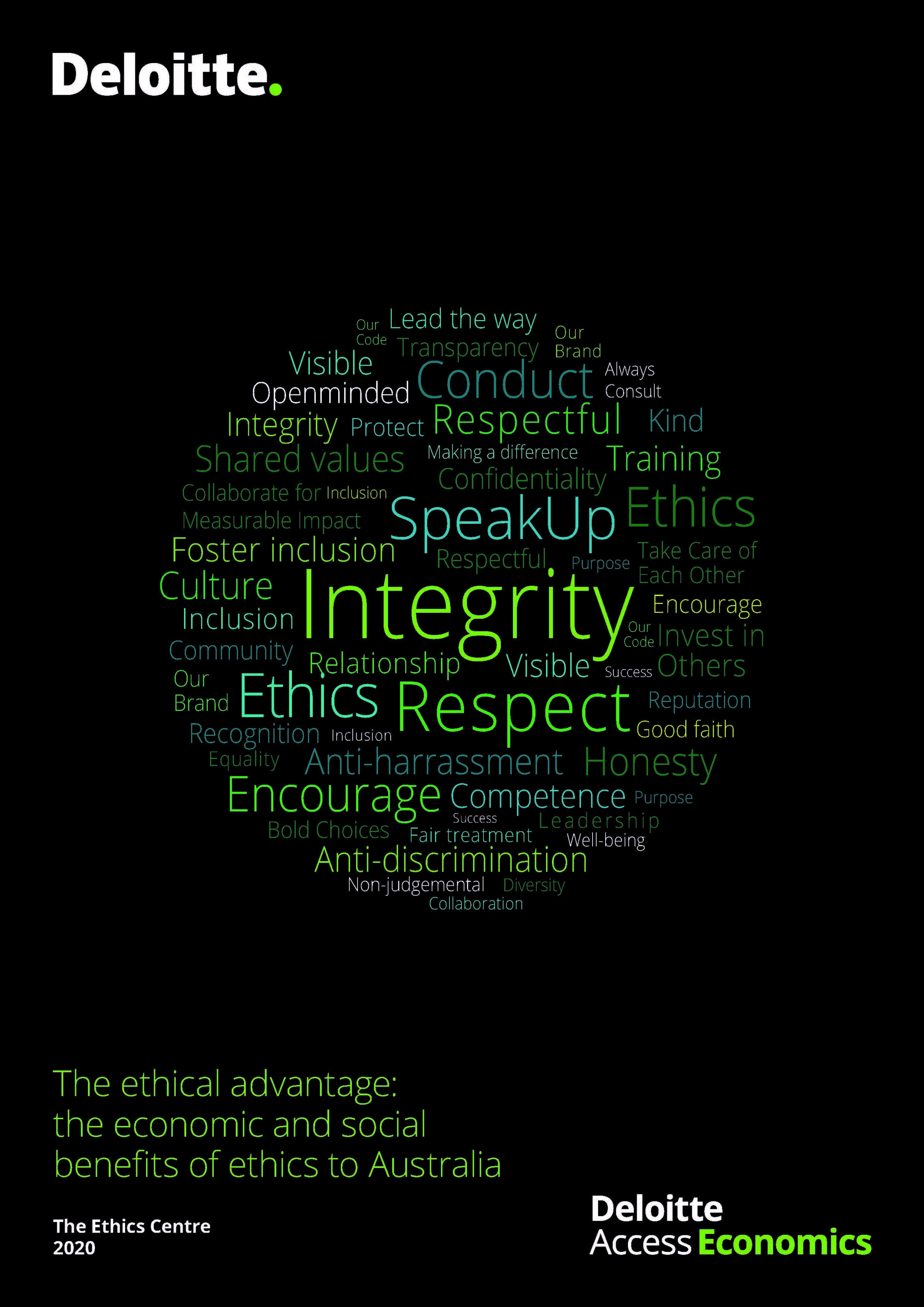
AUTHORS
Authors

John O'Mahony
John O’Mahony is a Partner at Deloitte Access Economics in Sydney and lead author of The Ethical Advantage report. John’s econometric research has been widely published and he has served as a Senior Economic Adviser for two Prime Ministers of Australia.

Ben?
John O’Mahony is a Partner at Deloitte Access Economics in Sydney and lead author of The Ethical Advantage report. John’s econometric research has been widely published and he has served as a Senior Economic Adviser for two Prime Ministers of Australia.
Download The Ethical Advantage Report
A Guide to Purpose, Values, Principles
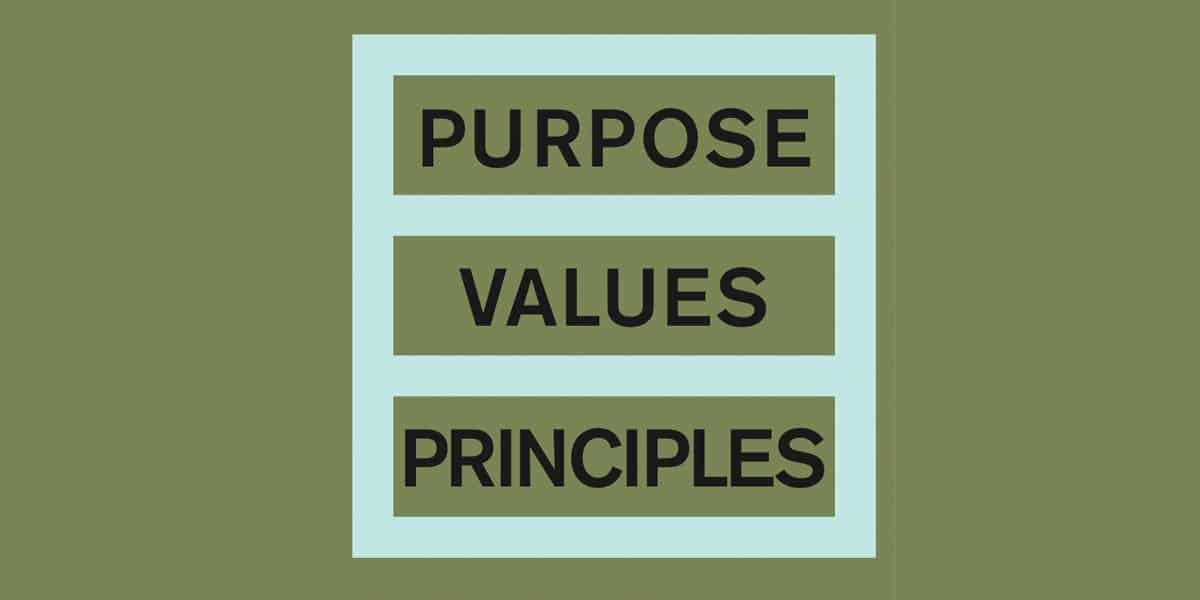
Purpose, Values, Principles: Ethics Framework Guide
A Guide to Purpose, Values, Principles
Each day, countless decisions are made within organisations of all shapes and sizes. An Ethics Framework provides a compass for those choices.
A solid Ethics Framework offers a clear statement of what an organisation believes in and what standards it applies. It’s a roadmap for good decisions, and if it’s lived throughout an organisation, it’s also a guide to making that organisation the best version of itself.
Fundamental to good business, every organisation should have an Ethics Framework to guide decision making; from Apple, Amazon and ANZ, to the Nedlands Netball Association.
"An Ethics Framework is foundational. It provides the blueprint for organisational decision making, delivering clarity, consistency and connection across all levels and responsibilities."
WHATS INSIDE?

Learn what an ethics framework is

Why you need an ethics framework

A step by step process to establish your own

Tools to embed your framework
Whats inside the guide?
AUTHORS
Authors

Dr Matt Beard
is a moral philosopher with an academic background in applied and military ethics. He has taught philosophy and ethics at university for several years, during which time he has been published widely in academic journals, book chapters and spoken at national and international conferences. Matt’s has advised the Australian Army on military ethics including technology design. In 2016, Matt won the Australasian Association of Philosophy prize for media engagement, recognising his “prolific contribution to public philosophy”. He regularly appears on television, radio, online and in print.
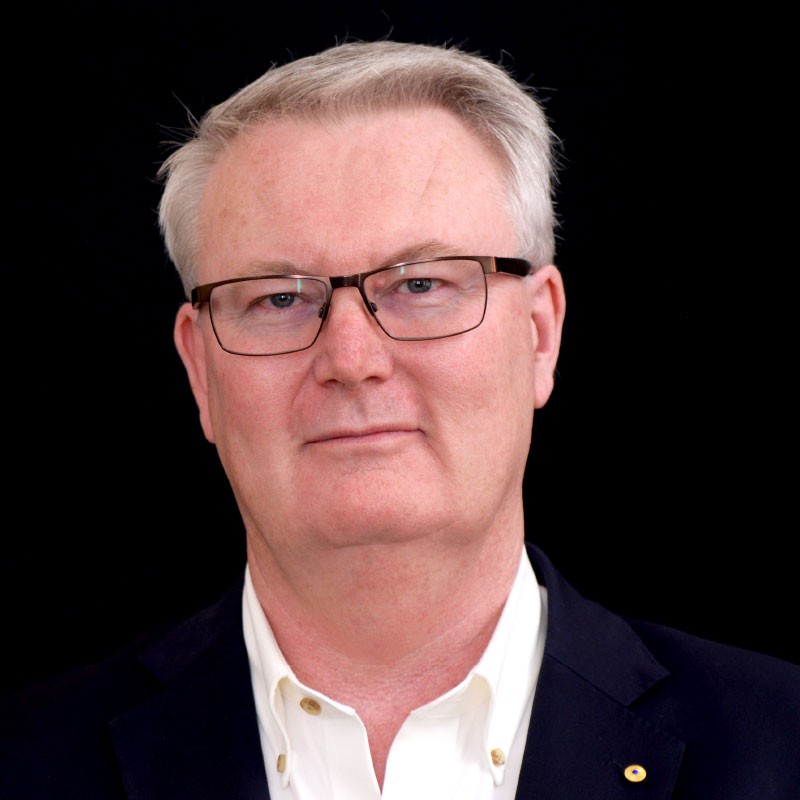
Dr Simon Longstaff
has been Executive Director of The Ethics Centre for over 25 years, working across business, government and society. He has a PhD in philosophy from Cambridge University, is a Fellow of CPA Australia and of the Royal Society of NSW, and in June 2016 was appointed an Honorary Professor at ANU – based at the National Centre for Indigenous Studies. Simon co-founded the Festival of Dangerous Ideas and played a pivotal role in establishing both the industry-led Banking and Finance Oath and ethics classes in primary schools. He was made an Officer of the Order of Australia (AO) in 2013.
DOWNLOAD A COPY

You may also be interested in...
Ethics in the Boardroom

Ethics in the Boardroom: A Decision-Making Guide for Directors
Ethics in the Boardroom: A Decision-Making Guide for Directors
The role of a director in governing an organisation is made more complex by a myriad of ethical issues that impact on board decision-making. Boardroom practices are also central to setting the right tone and values throughout an organisation.
Ethics in the Boardroom: A Decision-Making Guide has been developed in collaboration with the Australian Institute of Company Directors. Designed to support directors in considering ethical issues as they discharge their duties, it invites them to view the decisions they come up against through four key lenses.
This report is a vital resource for directors as a general reference, should be utilised by boards to strengthen their capacity in ethics, and by individual directors and boards alike to inform conversations about the complex issues they encounter in their roles.
"The the board of a corporation is, in effect, its mind and conscience. All that a corporation does and its effects on the world, is ultimately traced back to directors and their deliberations."
DR SIMON LONGSTAFF AO
WHATS INSIDE?

Understanding Ethics

Perspectives to frame board conversations

A decision making framework

General influences

The board’s collective culture and character

Interpersonal relationships and reasoning

The individual director

Practical Examples
Whats inside the guide?
AUTHORS
Authors

The Ethics Centre
The Ethics Centre is a not-for-profit organisation developing and delivering innovative programs, services and experiences, designed to bring ethics to the centre of personal and professional life. Our activities span ethics consulting and leadership for organisations from all sectors and of all sizes, Ethi-call, our free ethics helpline, live events, and advocacy campaigns. Our work brings people together to build their skills and capacity to live and act according to their values.

Australian Institute of Company Directors
The Australian Institute of Company Directors is committed to strengthening society through world-class governance. They aim to be the independent and trusted voice of governance, building the capability of a community of leaders for the benefit of society. Their membership of more than 45,000, includes directors and senior leaders from business, government and the not-for-profit sectors.
DOWNLOAD A COPY
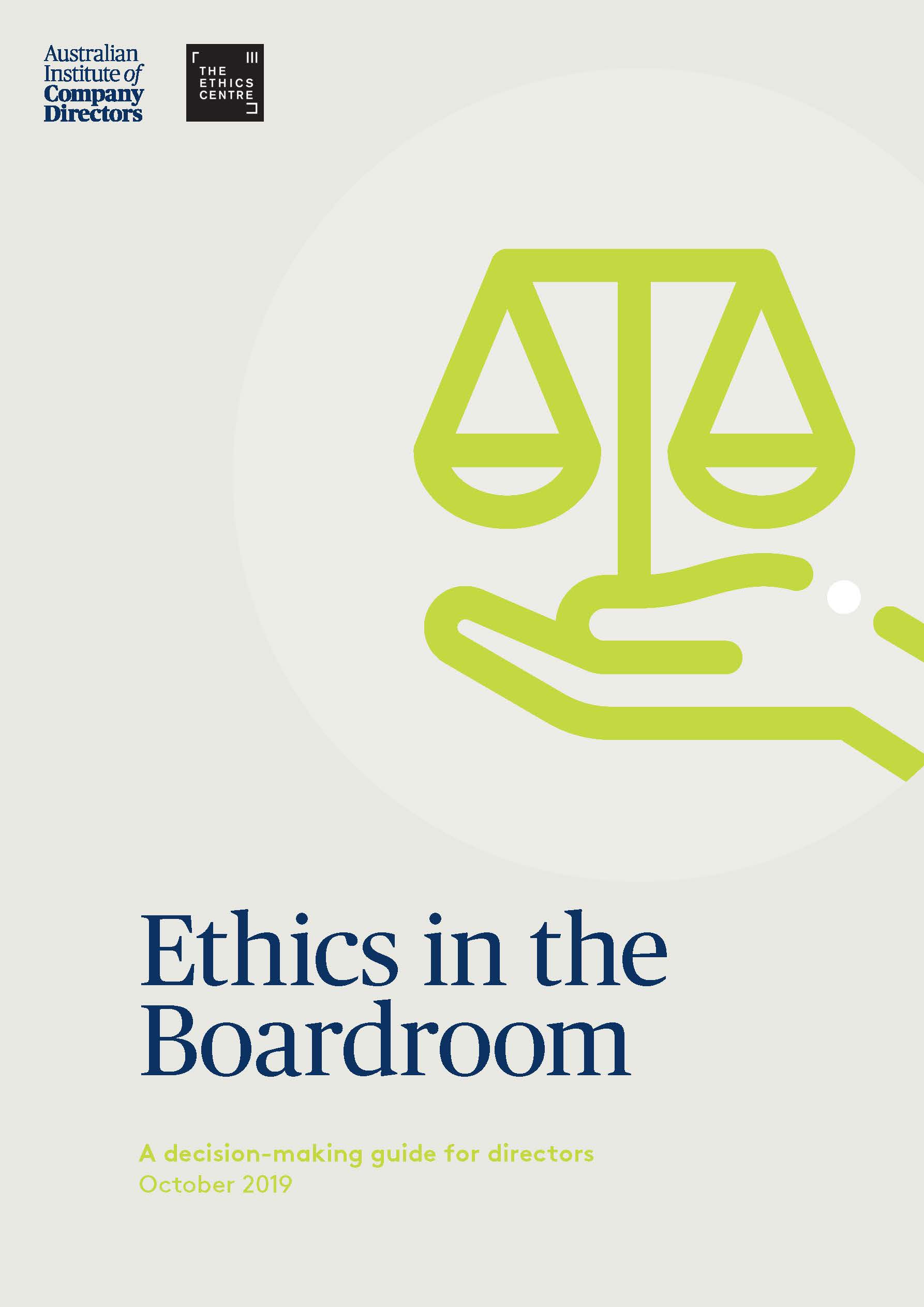
You may also be interested in...
The Cloven Giant: Reclaiming Intrinsic Dignity

Ethical by Design Evaluating Outcomes: Principles for Data and Development
The Cloven Giant: Reclaiming Intrinsic Dignity
An examination of the profound loss of trust in liberal democratic institutions and the rise of populism.
Until quite recently, the liberal democracies of the West seemed to have it all. Led by the United States, they had defeated the Soviet Union to win the Cold War.
They had created an unprecedented level of prosperity. They had projected their culture – with its underlying values and principles – into every corner of the world.
Yet, in almost no time at all, the threads have been unravelling. Major institutions have lost the trust of the people. Ideological divisions have deepened and potentially destructive forms of populism have been unleashed.
Today, the global, rules-based order is looking shaky and we seem doomed to return to a world where nations act alone and ‘might is right’. How did this happen? What went wrong?
This essay traces how Enlightenment ideals shaped the hopes and expectations of citizens – only to be betrayed by leaders who forgot the defining purposes of the institutions they lead.
"A political system based on the intrinsic dignity of citizens has been replaced with one defined by a series of transactions, in which the government has become a 'providore' hawking its goods to customers whose currency is a vote."
DR SIMON LONGSTAFF
WHAT'S INSIDE?

History of the enlightenment
Current and future states

Recovering intrinsic dignity

The ethics of building anew
DOWNLOAD THE REPORT
You may also be interested in...
Ethical by Design: Evaluating Outcomes

Ethical by Design Evaluating Outcomes: Principles for Data and Development
Ethical by Design Evaluating Outcomes: Principles for Data & Development
Understand the ethical considerations in using big data across aid and development projects, and get a practical framework for decision making.
The increasing focus on impact, and its measurement is not solely about accountability. Instead, in this paper Dr Simon Longstaff presents why it’s driven by the desire to do as much good as possible in resource-constained conditions.
Traditionally the evaluation and monitoring of development based projects has been undertaken on the ground. However new technologies, big data, and AI have given rise to a host of possibilities, and with them, new ethical considerations.
The paper draws on insights generated by a project by Australia’s Department for Foreign Affairs, of which The Ethics Centre has been in consultation.
It offers an example Ethical Framework for decision making in new technology innovation for womens’ empowerment in Afghanistan, and a host of core tenants or considerations specific to the measurement and evaluation of development projects across areas of organisation, projects and data.
The report also provides a practical understanding of the components of an Ethical Framework, the virtue of ethical restraint, and the role of value driven decision making to benefit vulnerable groups in aid development work. Plus access a decision making model to slow down thinking and consider new perspectives.
It’s a great resource for anyone working with or associated with aid work domestically or internationally, particularly those involved in evaluation, measurement and data collection.
"The ethical impulse that drives innovation in development is to be admired. It is the same impulse that has led a range of actors to explore the possibilities of new technologies – not least in the field of data science – to improve the quality of monitoring and evaluation"
DR SIMON LONGSTAFF
WHAT'S INSIDE?

Ethical restraint

Empowering the vulnerable

Ethical Framework

Ethical decision making model
AUTHORS
Authors

Dr Simon Longstaff
Dr Simon Longstaff has been Executive Director of The Ethics Centre for 30 years, working across business, government and society. He has a PhD in philosophy from Cambridge University, is a Fellow of CPA Australia and of the Royal Society of NSW, and an Honorary Professor at ANU National Centre for Indigenous Studies. Simon was made an Officer of the Order of Australia (AO) in 2013.
DOWNLOAD THE REPORT
You may also be interested in...
Thought Leadership: Ethics in Procurement
Ethics in Procurement Report: The Ethics Alliance
Ethics in Procurement examines the ethical issues and tensions that arise in payment of suppliers, and provides a framework for ensuring fair transactions.
The Ethics Alliance is a corporate community, designed to share challenges and take a collaborative approach to finding solutions. At our inaugural gathering, an Alliance member called out the crippling impact late payments was having on his business. Through conversation, it became evident this was an issue shared by many members and unintentionally caused by others, and was a problem we wanted to help solve.
This guidebook came together after a series of interviews with members and a follow up roundtable discussion that explored both systemic and principle-based solutions. It examines some of the procurement-based issues identified through that process, looking at the causes of ethical tension and offering frameworks for each stage of the procurement process.
Formulated as a practical solution, the paper considers common challenges including:
- Should companies have an open tender and invite all to bid, or save time and money by targeting known suppliers?
- Should companies accept the cheapest complying bid, or pay more to a company that distributes a proportion of its profits to a good cause?
- Should companies be transparent in their dealings with suppliers, or will this open them up to disputes?
- Is it reasonable for companies to impose a significant administrative burden in the first round of a tender process by asking for information which is not directly relevant to the project in question?
Plus, it provides a framework to make payment processes fair, practical and ethical.
"Organisations that are buying goods or services can encounter many forks in the road, requiring decisions on how to respond. By viewing those questions through an ethical lens, we are more able to make decisions that align with the purpose, values, and principles that our organisations are committed to - and that we may hold as individuals."
WHAT'S INSIDE?

Ensuring a fair transaction

Looking after your suppliers

Practical issues to be solved

Reasons you might have a problem

A practical framework

An ethical framework
AUTHORS
Contributors
Writing and Research
Ben Robinson lead the writing and research for this report. He has worked in various roles at The Ethics Centre since 2016. Ben studied Philosophy and Political Economy at the University of Sydney, and is a Graduate Ethics and Sustainability Consultant at Deloitte.
Member contributions
The following Ethics Alliance members generously gave their time to talk to us about the procurement issues affecting their business: Shell Australia, Macquarie Bank, Clayton Utz, The Reserve Bank of Australia, Allianz, TrinityP3, The Business Council of Australia, AIA Australia and Insurance Australia Group (IAG).
A special thank you to Shell Australia who generously shared their market leading approach to procurement with The Ethics Alliance, providing the context and structure for the practical framework offered in this report.
You may also be interested in...
EVERYDAY ETHICS FOR FINANCIAL ADVISERS

Everyday Ethics for Financial Advisers: A Guide for the Ethical Professional
Everyday Ethics for Financial Advisers
This practical guide for Australian financial advisers, offers ethical decision making frameworks and practice case studies based on the five values and 12 standards of the Code.
Every day, and in every client interaction, financial advisers face ethical decisions. In whose best interests are you operating in? Are you recommending the best investment for your client? Do you know enough about your client’s situation to be giving this advice?
Everyday Ethics for Financial Advisers has been written to help you comply with the FASEA Code of Ethics. It’s a practical guide for Australian financial advisers to put lessons into practice through the use of ethical decision making frameworks, and is supported by real case studies based on the five values and 12 standards of the Code.
The guide has been written for lecturers, students and current advisers. It’s designed to fulfil the curriculum requirements for FASEA’s Ethics and Professionalism Bridging Course and FASEA’s National Financial Planning Curriculum, to help readers obtain the necessary certifications required to operate as an adviser in the Australian market.
Everyday Ethics for Financial Advisers is accessible and easy to read. It offers practical ways to apply ethical frameworks to real-life scenarios. It’s a textbook intended to be a long term companion as you develop your ethical muscle throughout your career as a financial adviser.
On sale now through all major online book retailers.
"The ideal is for this emerging profession to have a common ethical foundation, enriched by a common understanding, informed by a common set of educational experiences. Our hope is that this new text will be widely embraced across the profession - for the good of society and the clients it serves."
DR SIMON LONGSTAFF
WHAT'S INSIDE?

The opportunities for an emerging profession

What is ethics?

Influences on decisions and behaviour

The financial advice environment

The Financial Planners and Advisers Code of Ethics 2019

Ethical decision making frameworks
Ethics in leadership and business practices
Lecturer's supplement
AUTHORS
Authors

Dr Simon Longstaff
Dr Simon Longstaff has been Executive Director of The Ethics Centre for 30 years, working across business, government and society. He has a PhD in philosophy from Cambridge University, is a Fellow of CPA Australia and of the Royal Society of NSW, and an Honorary Professor at ANU National Centre for Indigenous Studies. Simon was made an Officer of the Order of Australia (AO) in 2013.

Dr Katherine Hunt
Dr Katherine Hunt is a researcher and lecturer at Griffith University. She has worked as a financial adviser for five years and combines this with her education in Psychology, Finance, Law and Economics to design and implement curriculums which deliver the greatest possible impact. Katherine holds the following qualifications; BPsychSc, B Comm (Financial Planning), Honours in Finance (University Medal), PhD, JP (Qualified).

Carloyn Tate
Carolyn Tate spent her first 20 years of working life in the banking industry and the last 18 years as a freelance writer, educator and consultant. She’s written four business books and one travel memoir, Unstuck in Provence. She’s a founding member of Conscious Capitalism and her company is a Certified B Corporation. Carolyn specialises in researching and writing on subjects that will improve human and planetary conditions such as purpose, leadership, ethics and gender equality.
You may also be interested in...
Managing Culture: A Good Practice Guide

Managing Culture: A Good Practice Guide
Managing Culture: A Good Practice Guide
A practical framework for organisations and companies to establish a healthy and robust workplace culture.
Culture is a key determinant in the performance of an organisation, and of its ability to achieve its purpose. Yet all too often we see companies with a living culture and set of behaviours that is disconnected from the values and principles it aims to uphold. Where strong ethical cultures thrive, the system and processes of the organisation align closely with their purpose, values and principles – what we call, their ethical framework.
The Managing Culture guide is for all organisations looking to establish a thriving workplace culture. Produced in conjunction with the Institute for Internal Auditors – Australia, Governance Institute of Australia and Chartered Accountants Australia New Zealand, it’s a practical guide to how every group within an organisation can contribute to good culture.
The guide explores why and how an ethical framework – as opposed to a code of ethics or code of conduct – should sit at the heart of the governance of every organisation. It offers practical direction on how an organisation might understand their current state of affairs, and monitor culture going forward. It provides support on how to achieve an ideal culture in alignment with an organisation’s ethical framework, and how all areas of business from the board through to management, HR, internal and external audit can play a vital role.
"The multidimensional approach to exploring risk culture written about here draws out best practice and informs pathways to change."
JOHN PRICE COMMISSIONER, AUSTRALIAN SECURITIES & INVESTMENTS COMMISSION
WHATS INSIDE?

What is culture?

Cultural regulators

How to identify desired culture

How to identify desired culture

Embedding culture

The role of governance

Drivers of good culture

Assurance + risk

Indicators + red flags

Design challenges + solutions
AUTHORS
Authors
The Ethics Centre
The Ethics Centre is an independent not-for-profit organisation that has been working for 30 years to help people navigate the complexity and uncertainty of difficult ethical issues through innovative programs, services, events and experiences. TEC work with organisations looking to navigate complex issues with ethics at the centre, with activities that span live events, ethics consulting services, award winning education programs, a free ethics helpline, and counselling services. At the core of that work is a commitment to assisting organisations to develop and refine their Ethical Framework of purpose, values and principles.

Institute for Internal Auditors – Australia (IIA-A)
IA-Australia is the national professional body representing the internal audit profession. They are responsible for leading the direction of the internal audit profession in Australia. IIA-Australia’s role is to connect and support Internal Auditors throughout their careers for the advancement of the profession.
They provide knowledge, training, advocacy and representation to promote the standing of the internal audit profession, as well as to develop internal audit better practice within workplaces.

Chartered Accountants Australia New Zealand
Chartered Accountants Australia and New Zealand was established with a goal to provide a professional membership body relevant to our members, equipping them to stand out in today’s marketplace. They are a professional body made up of over 120,000 diverse, talented and financially astute professionals who utilise their skills every day to make a difference for businesses the world over.
DOWNLOAD A COPY

You may also be interested in...
Thought Leadership: Ethics at Work, a 2018 Survey of Employees

Ethics at Work: 2018 Survey of Employees
Ethics at Work: 2018 Survey of Employees
Ethics at Work is the first national survey of Australian workers, probing nearly 800 Australians about their attitude to ethics in the workplace.
The survey, undertaken by the Institute of Business Ethics in partnership with our team at The Ethics Centre, asks what are employees’ attitudes to and perceptions of ethics in their place of work? Do they feel able to speak up if they have been aware of misconduct? Are formal ethics programs effective in embedding ethical values into organisational culture and influencing behaviour? What are the challenges and what should be the focus going forward?
This report forms part of a broader collection of publications covering parts of Europe, the UK, Canada, Singapore and New Zealand which aim to develop an understanding of employees’ attitudes to, and perceptions of, ethics in the workplace. The Ethics Centre is proud to be the first national partner to glean valuable insights into the Australian experience, and how we compare with other countries around the globe.
"At The Ethics Centre, we believe that employees’ views are a key indicator of the ethical temperature of any organisation. These results reveal that many Australians don’t trust that the current systems for speaking up against unethical behaviour are there to support them, and are choosing to stay quiet or compromise their own values."
JOHN NEIL, HEAD OF INNOVATION, THE ETHICS CENTRE
OVERVIEW
WHATS INSIDE?

Key findings

Survey themes

Spotlight issues

Areas for focus and change
AUTHORS
Authors

Guendalina Dondé
Guendalina Dondé is Senior Researcher at the Institute of Business Ethics. She writes and researches on a range of business ethics topics for the IBE. Before joining the IBE, she collaborated in developing the code of ethics for the Italian Association of Management Consultants and worked for a European CSR Business Network in Brussels. She holds a Master’s degree in Business Ethics and CSR from the University of Trento in Italy.
You may also be interested in...
Trust, Legitimacy & the Ethical Foundations of the Market Economy

Trust, Legitimacy & the Ethical Foundations of the Market Economy
Trust, Legitimacy & the Ethical Foundations of the Market Economy
At The Ethics Centre, we spend a lot of time talking to regulators, directors and business leaders.
We know that fundamental questions are being asked: What went wrong? Who’s responsible? How do we restore trust? Our research suggests the concept of trust may be less relevant than that of ‘legitimacy’. Where trust is the belief that people/organisations will meet their obligations, legitimacy is the right to claim a status, role or function. Legitimacy, in other words, grants business the social license to operate.
This whitepaper offers insights on the current issues of trust and loss of limited liability, and a framework to participate in the current market economy. Discover the four fundamental values and principles you need to minimise the risk of corporate failure and the potential for unlimited liability. Learn how your purpose, values and principles can be used to guide behaviour and work through the most difficult decisions within an organisation.
"The privileges of incorporation and limited liability were justified by a broad appeal to the common good. If those privileges are to be preserved, then it may be time to establish a new, core ethical foundation for corporations. An alternative and complementary approach to more compliance is to establish a values and principles framework that guides rather than dictates decision-makers."
DR SIMON LONGSTAFF
OVERVIEW
*Source: Edelman Trust Barometer 2017
**Source: AICD-KPMG Maintaining the social licence to operate: 2018 Trust Survey
***Source: PWC, 21st Annual Global CEO Survey
WHATS INSIDE?

An examination of trust’s decline

What is legitimacy?

The costs of losing legitimacy

Ethical foundations of the market

Reimagining corporate law

Four fundamental values and principles

Enabling legitimacy in corporations

The value of ethical frameworks
AUTHORS
Authors

Dr Simon Longstaff
Dr Simon Longstaff has been Executive Director of The Ethics Centre for over 25 years, working across business, government and society. He has a PhD in philosophy from Cambridge University, is a Fellow of CPA Australia and of the Royal Society of NSW, and in June 2016 was appointed an Honorary Professor at ANU – based at the National Centre for Indigenous Studies. Simon co-founded the Festival of Dangerous Ideas and played a pivotal role in establishing both the industry-led Banking and Finance Oath and ethics classes in primary schools. He was made an Officer of the Order of Australia (AO) in 2013.

Victoria Whitaker
Victoria Whitaker has worked across business, civil society, academia and government in the areas of sustainability education, research, policy and advocacy, strategy and evaluation. She previously headed up the Global Reporting Initiative in Australia for five years, before joining The Ethics Centre to manage their consulting and education offering. In January 2019, Victoria joined Deloitte’s risk team.
DOWNLOAD A COPY

